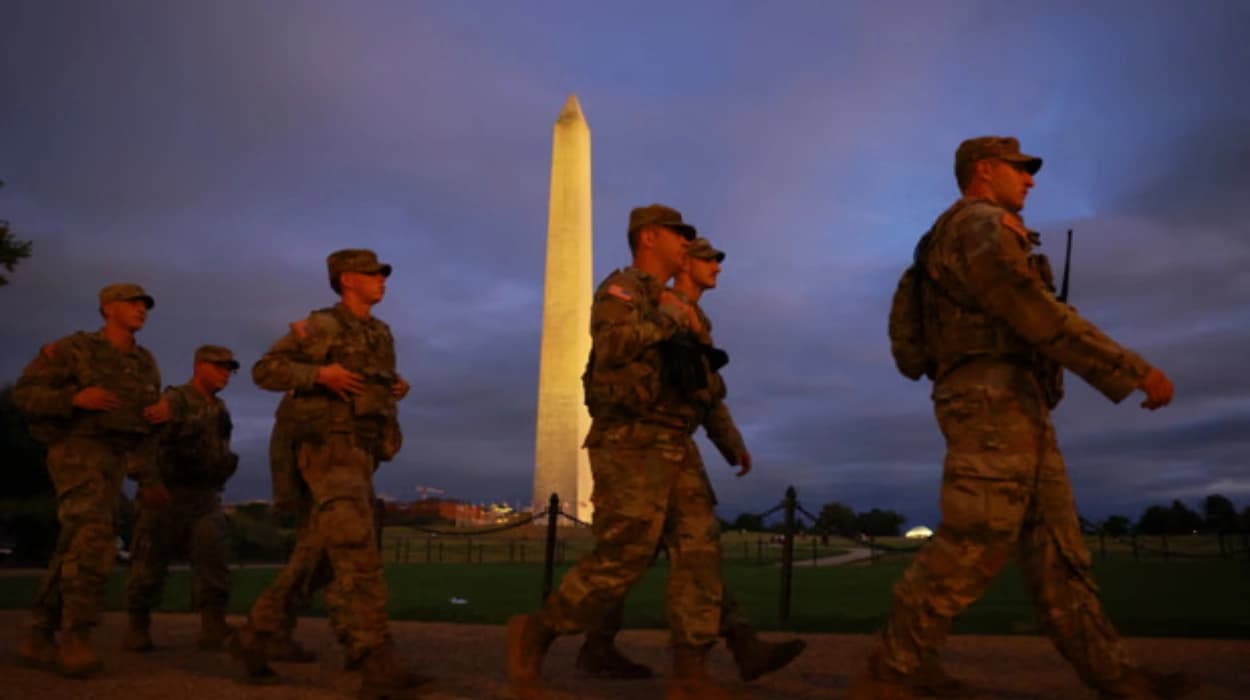Summary
- Trump targets Chicago next for a federal crime crackdown.
- New York also planned for law enforcement action.
- Defense Secretary Pete Hegseth orders weapons for DC troops.
- Trump may deploy a regular military alongside the National Guard.
- Plans follow recent crackdowns in Washington, D.C. crackdown.
The military department did not immediately provide any additional information regarding the new development or the reasons behind its abrupt announcement that it would now arm the federalized troops in Washington, DC.
The US president talked to reporters in the Oval Office and said:
“When ready, we will start in Chicago … Chicago is a mess.”
He added that then the administration “will help with New York”, amid the controversial and aggressive federal efforts to control leading Democratic-voting cities, each of which has a Black mayor.
With about 2,000 national guard personnel stationed in the nation's capital, the action represents an increase in the federal government's infrequent involvement in city policing.
To support the DC national guard, hundreds of troops from numerous states with Republican governors arrived earlier this week.
Last Wednesday, the US army and the Pentagon declared that troops would not be carrying guns.
According to a person familiar with the discussions, earlier this week the city was notified of the intention to arm the national guard. The individual spoke on condition of anonymity and was not allowed to reveal the plans.
A defense official told CNN:
“At the direction of the secretary of defense, [Joint Task Force] JTF-DC members supporting the mission to lower the crime rate in our nation’s capital will soon be on mission with their service-issued weapons, consistent with their mission and training.”
Under legislation and constitutional powers that give the federal government more control over the nation's capital than other cities, Trump assumed leadership of the Washington, DC, police department earlier this month and sent out the national guard. Despite local authorities' protests, the US president asserts that the district's homelessness and crime rate represent a crisis.
The state governor is in charge of the force and has the authority to send out the national guard in an emergency. In other states, the state is in charge of the national guard. Rarely, during a declared national emergency—usually at the governor of the state in question's request—the federal government assumes command of a state's national guard.
In an almost unprecedented anomaly, Trump federalized the California national guard earlier this summer in response to protests against Immigration and Customs Enforcement (Ice) in sections of Los Angeles, despite the state's governor, Gavin Newsom, objecting.
Hegseth's directives follow a day after top federal prosecutor Jeanine Pirro of the District of Columbia, who limited prosecutors' discretion as the Trump administration stepped up its law enforcement presence in the capital, told them to press for the most serious charges in cases involving recent arrests.
“In line with President Trump’s directive to make DC safe, US attorney Pirro has made it clear that the old way of doing things is unacceptable,”
spokesman Tim Lauer told the newspaper.
“She directed her staff to charge the highest crime that is supported by the law and the evidence.”
According to Pirro's response, the regulation does not apply to situations involving serious crimes or people who are prohibited from possessing firearms. She claimed that the modification was made in response to advice from the US Supreme Court and the solicitor general of the Justice Department.
Trump announced the success of his takeover of the Metropolitan Police Department on Thursday.
He had previously hinted that he might target additional cities with Black mayors and a high Democratic vote, including New York, Chicago, Oakland, Baltimore, and another mission in Los Angeles. Wes Moore, the governor of Maryland, said that community violence prevention initiatives were reducing crime in Baltimore and that he would never call in the national guard "for theatrics."
What legal authority allows federal troops to carry firearms in DC?
Secretary of Defense Pete Hegseth issued an order authorizing National Guard members stationed in D.C. to carry "service-issued firearms" while performing law enforcement-related duties as part of the Joint Task Force-D.C.
This authorization has received formal approval from the U.S. Marshals Service.
National Guard troops involved in direct law enforcement support will be armed, while those involved in non-law enforcement activities may remain unarmed.
The Posse Comitatus Act, which generally prohibits the use of federal military forces for domestic law enforcement, does not apply to National Guard troops under state authority or in D.C. due to its unique status. However, when National Guard troops are federally activated under Title 10, they become subject to Posse Comitatus restrictions unless explicitly waived.

